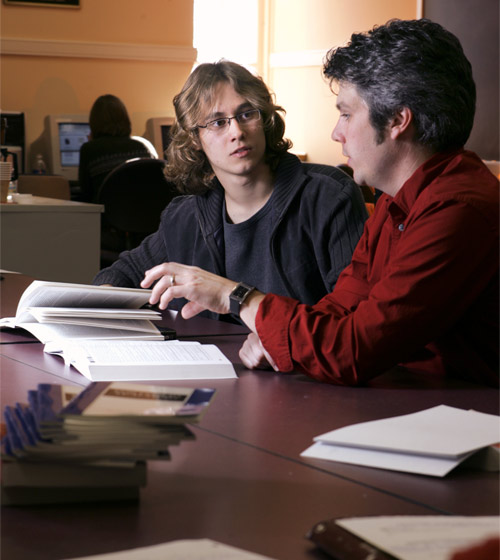Having already published a book in his home country, Tomas Bielskis ’07 (Siauliai, Lithuania) is conducting research on the rhetoric behind political wedge issues and how language is used to polarize society in debate over the most divisive issues in American politics.
He will discuss his research noon today in Skillman Library room 206. Lunch will be provided.
With English being Bielskis’ third language, he is not only learning to critically analyze political rhetoric, he also is learning about American politics and society in a language that he struggled with only a year and a half ago.
The research primarily deals with same-sex marriage and applies critical discourse analysis, the study of how discourse produces and reproduces societal and political views. It examines the language used to support the arguments for and against same-sex marriage and the motives behind it.
A double major in English and economics & business, Bielskis is working with William Carpenter, assistant professor of English, through Lafayette’s distinctive EXCEL Scholars program, in which students conduct research with faculty while earning a stipend. The program has helped to make Lafayette a national leader in undergraduate research. Many of the more than 160 students who participate each year share their work through articles in academic journals and/or conference presentations.
Editor of the Allyn and Bacon Sourcebook for Writing Program Administrators (2001), Carpenter’s specialties include writing pedagogy, literacy, and discourse analysis. He is collaborating with Bianca Falbo, assistant professor of English, on a book examining the literacy habits of successful college writers. For the past three years he has organized Lafayette’s on-line discussion board for first-year student orientation while also serving as an assistant director of the College Writing Program. He was integral in helping to develop the new minor in writing for the English department.
Since Bielskis’ first visit to America came only a year and a half ago — when he became a first-year student at Lafayette — one might think his lack of familiarity with the country would prevent him from being qualified to assist with scholarly research on such a multi-faceted project.
But Carpenter saw Bielskis’ capabilities and potential.
“I was very impressed with his credentials,” he says. “Not only did he have to become more proficient with English during his first year at Lafayette, he went to Middlebury College last summer to study Spanish, which he had never taken before. He’s a writing associate in Lafayette’s College Writing program, where he serves as a peer tutor and helps first-year students write papers. It all showed me that he has a facility for languages and that he is very determined.”
“I have always liked foreign languages,” says Bielskis, who also speaks Russian as well as his native Lithuanian. “It’s a big advantage to be able to speak to people in their native language.”
“Doing this research is going to help me in many ways,” he adds. “I will improve my English and learn the rhetoric of political discourse, which will develop my language skills. The research will definitely be useful in whatever I do, and I am learning about U.S. political and social issues as well.”
The mentor-student relationship is one of the strengths of the EXCEL program, according to Carpenter, who stresses that it allows a professor to link teaching and research.
“This is an inter-disciplinary project that will teach him language, rhetoric, and political and social issues,” he says. “I thought it would be a great learning experience for him, but he is teaching me as well. Since English isn’t second nature for him, he’ll ask me some questions one wouldn’t expect. He brings an outside perspective that causes me to think about how things are perceived [in political discourse] that I might not have questioned otherwise.”
Bielskis’ research consists of gathering and analyzing primary sources of information, including presidential and congressional speeches and press conferences, editorials, newspaper articles, and government web sites.
The opportunity to build close relationships with professors like Carpenter is one of the reasons Bielskis chose Lafayette.
“I wanted a small liberal arts school where I could do a lot of research,” he says. “I looked into a lot of schools in the U.S. and Lafayette had the size, curriculum, and academic excellence I wanted. And I liked its location.”
His thorough investigation into finding Lafayette led Bielskis to co-author a book with a high school companion that discusses the possibilities of undergraduate studies in the U.S. for Lithuanians.
“We had to figure out everything on our own because studying abroad is not a developed field in Lithuania,” he says. “Afterwards we had a lot of information that we found and used in our application process. We decided to put it all in a book, so other people looking for possibilities of studying in the U.S. would have something to guide them.”
The book became a best seller and is roughly translated as The $150,000 Value Book.
In addition to serving as a writing associate, Bielskis is a member of and peer adviser for the International Students Association.
As a national leader in undergraduate research, Lafayette sends one of the largest contingents to the National Conference on Undergraduate Research each year. Thirty-nine students were accepted to present their work at this year’s annual conference.

Tomas Bielskis ’07 is conducting research on rhetoric in American politics as an EXCEL Scholar working with William Carpenter, assistant professor of English.
